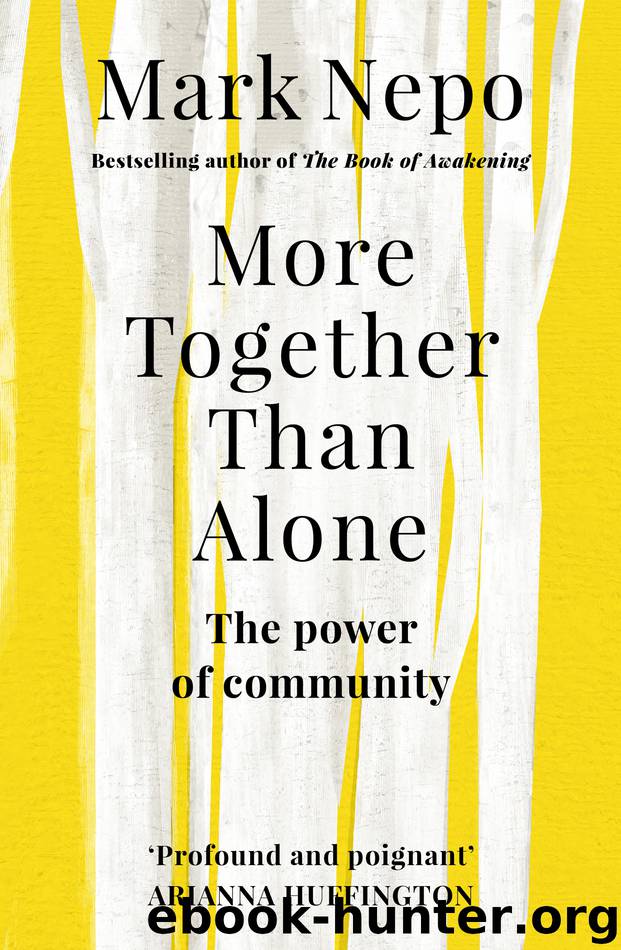More Together Than Alone by Mark Nepo

Author:Mark Nepo
Language: eng
Format: epub
Publisher: Ebury Publishing
The moment we value the brick over the person, we lose the ability to understand each other, and the moment we dare to speak humbly and directly from our heart, we find each other.
Removing the Oldest Wall
ACCESS TO KNOWLEDGE is a major step in deepening community, because it welcomes individuals into the ongoing conversation that is the life of community. A compelling example took place in Hanyang, Korea (now Seoul, South Korea), in 1443, when Sejong the Great (1397–1450) created a phonetic alphabet, Hangul, for the people of Korea. Three years later, Sejong made Hangul public.1 This extended literacy beyond the ruling class. With the creation of Hangul, knowledge and the conversation it opens became available to everyone. Now everyone had a voice.
This monarch found the courage to go beyond his own frame of reference to empower his people as they had never been empowered. How do we find this courage in ourselves?
A Buddhist by nature and education, Sejong became king when his elder brothers, seeing his gifts, abdicated their chance to rule so that Sejong ascended the throne. He quickly showed his innovation and compassion.
Sejong created a farmer’s handbook, to gather and preserve the experience of farmers.2 He allowed his people to pay more or less tax according to the fluctuations of their prosperity and hardship. When the palace had a surplus of food, Sejong distributed food to the peasants and farmers in need. And he established the Hall of Worthies (Jiphyeonjeon) at his palace, a gathering of scholars, sages, scientists, and physicians charged with furthering specific knowledge in science, medicine, and literature while making these advances available to all.
Moved by the illiteracy of his people, Sejong instructed scholars in the Hall of Worthies to construct a phonetic language that would be easy to learn. The new language, Hangul, was issued on October 9, 1446, in a royal document, the Hunminjeongeum, which means the verbally right sounds meant to teach the people.
Within days, new practitioners, regardless of their background, were able to read, write, and converse. The gift of language removed the oldest wall between the villages of Korea, the thick wall of ignorance. As a life of exchange spread throughout the country, the culture became animated.
In his introduction to Hangul, Sejong wrote that he was saddened by his people’s inability to state their concerns.3 And so, he charged the educated to help the uneducated, not just by sharing knowledge, but by offering the uneducated the means by which to become equal members of their society. He placed the shared interests and common well-being of his people first, and used his power to distribute opportunity and capital fairly.
He made literacy free and extended the capacity for voice to the Korean people forever. In modern Korea, October 9 is still celebrated as Hangul day, honoring Sejong. His ability to lead by listening affirms that the first cause of community, and the first strength of character for a leader, is to assess the needs of the community and to find the means by which to enhance everyone’s capacity.
Download
This site does not store any files on its server. We only index and link to content provided by other sites. Please contact the content providers to delete copyright contents if any and email us, we'll remove relevant links or contents immediately.
The Four Agreements by Don Miguel Ruiz(6735)
Flow by Mihaly Csikszentmihalyi(4680)
The Four Tendencies by Gretchen Rubin(4592)
Adulting by Kelly Williams Brown(4561)
You Do You by Sarah Knight(4464)
The Hacking of the American Mind by Robert H. Lustig(4361)
Ikigai by Héctor García & Francesc Miralles(4229)
Right Here, Right Now by Georgia Beers(4194)
A Simplified Life by Emily Ley(4155)
The Art of Happiness by The Dalai Lama(4118)
The Power of Positive Thinking by Norman Vincent Peale(4053)
The Little Book of Hygge by Meik Wiking(3676)
The French Women Don't Get Fat Cookbook by Mireille Guiliano(3650)
The Heroin Diaries by Nikki Sixx(3538)
The Courage to Be Disliked by Ichiro Kishimi & Fumitake Koga(3475)
The Choice by Edith Eva Eger(3467)
Why Buddhism is True by Robert Wright(3441)
Spark Joy by Marie Kondo(3293)
Make Your Bed by William H. Mcraven(3170)
